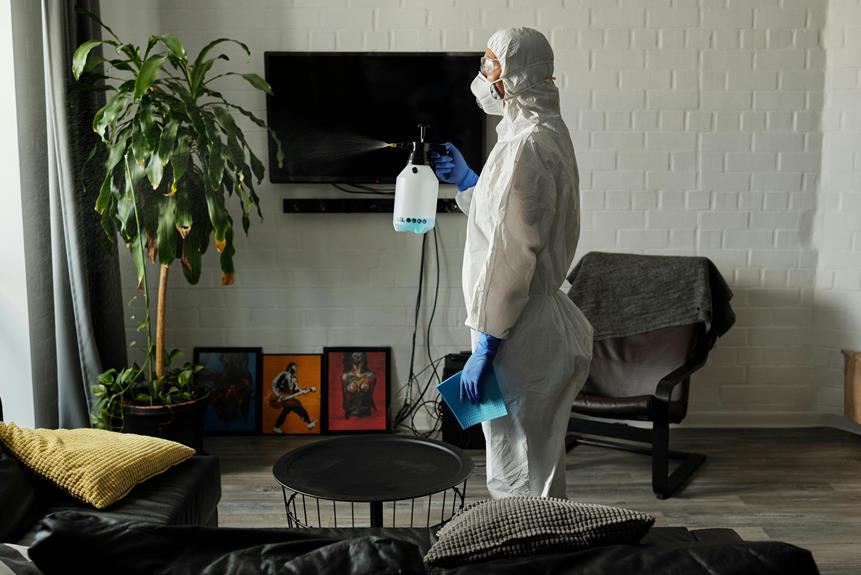You need a TV signal booster if your viewing experience is suffering due to poor signal quality, pixelation, or frequent disruptions. Boosters are essential when connecting multiple TVs to a single antenna, as splitting weakens the signal. They also help if you live far from broadcast towers, especially in rural areas. Electronic interference from nearby devices can affect signal clarity, and a booster with interference filters can help. For weak reception areas, a signal booster amplifies and stabilizes the signal, ensuring clear reception. Understanding these scenarios helps you determine the necessity of a TV signal booster for best performance.
Key Information
- Use a TV signal booster if experiencing pixelation or frequent disruptions due to poor signal quality.
- A booster is required when connecting multiple TVs to a single antenna to amplify and maintain signal strength.
- Install a booster if you live far from broadcast towers to enhance and stabilize weak signals.
- Consider a booster if electronic interference from nearby devices affects your TV signal quality.
- Boosters are necessary in weak reception areas to improve and maintain clear picture quality.
Poor Signal Quality
Experiencing poor signal quality can lead to pixelation and frequent picture disruptions on your TV. To counteract this, you might need a TV signal booster.
Signal boosters amplify weak signals, improving both strength and stability, which enhances your overall viewing experience. In areas with inadequate reception due to distance from broadcast towers or interference, a booster can be essential. It guarantees you receive a clear picture by preventing signal loss.
Installing a booster between your antenna and TV can greatly reduce interruptions, providing a more consistent and enjoyable experience. Remember, the booster should be placed as close to the antenna as possible to maximize its effectiveness and ensure top-notch signal enhancement.
Multiple TV Connections
If you're connecting multiple TVs to a single antenna signal, a TV signal booster is indispensable for maintaining strong and clear reception across all devices.
When you split an antenna signal to multiple TVs, each split reduces the signal strength, leading to weaker signals and poorer picture quality. A TV signal booster amplifies the signal before it splits, ensuring each connected TV receives a robust and clear signal without degradation.
This amplification prevents signal loss, providing reliable and consistent reception across all your TVs. Without a booster, you risk uneven signal distribution, resulting in some TVs displaying subpar images.
To optimize your viewing experience on multiple devices, integrating a signal booster is essential.
Long Distance From Tower
Living far from television broadcast towers often necessitates the use of a TV signal booster to guarantee strong and reliable reception. When you're located in rural or remote areas, the distance from broadcast towers can weaken signal reception.
A TV signal booster enhances signal strength, helping to overcome degradation caused by these long distances. This guarantees you receive a clearer, more consistent picture.
Additionally, if your setup involves long cable runs, a booster can compensate for the signal loss that occurs over these extended lengths, maintaining top-notch reception quality. By installing a TV signal booster, you'll greatly enhance your viewing experience, even when you're miles away from the nearest broadcast tower.
Electronic Interference
While distance from broadcast towers is a common issue, electronic interference can also greatly affect your TV signal quality. Interference from nearby electrical devices, power lines, and wireless gadgets often causes pixelation or a complete loss of picture.
To minimize this, keep your TV away from electronic devices and use shielded cables. Interference impacts both analog and digital signals, degrading your viewing experience.
A TV signal booster with built-in interference filters can noticeably improve signal quality in areas prone to electronic disruption. By isolating your TV setup from potential sources of interference and enhancing the signal strength with a booster, you can achieve a clear and consistent picture.
Weak Reception Areas
In weak reception areas, a TV signal booster is essential for enhancing signal quality and maintaining stable picture clarity. When you're far from broadcast towers or face interference, boosters can greatly improve your viewing experience. These devices are especially useful in rural locations where signal strength is often compromised.
Consider using a TV signal booster if you experience:
- Pixelation: Blocks or disruptions in your picture.
- Disruptions: Frequent signal drops or interruptions.
- Poor picture quality: Blurry or unclear images.
- Distance issues: Far from broadcast towers.
- Multiple TVs: Need to push signals to several TVs from one antenna.
A booster amplifies weak signals, providing clear and stable reception even in challenging areas.
Frequently Asked Questions
When Should I Use a TV Signal Booster?
You should use a TV signal booster when experiencing poor reception, pixelation, or picture break-up. It's also useful in rural areas, places with signal interference, or when distributing signals to multiple TVs from one antenna.
Do I Need a TV Booster?
You'll need a TV booster if you notice pixelation, picture break-up, or weak signal reception. It's crucial for rural areas, long cable runs, or multiple TV setups to guarantee consistent, high-quality signal distribution.
Do TV Signal Boosters Really Work?
Yes, TV signal boosters truly work. They amplify weak signals, reducing pixelation and disruptions. In areas with poor signal strength, a well-installed booster considerably enhances reception quality, making a noticeable difference in signal clarity and viewing experience.
Where Is the Best Place to Put a TV Signal Booster?
Position your TV signal booster near the antenna to amplify the signal before any loss. Avoid interference-prone areas, secure a stable power source, and keep it moisture-free for peak performance and better signal reception.
Conclusion
If you're experiencing poor signal quality, have multiple TV connections, are far from the broadcast tower, face electronic interference, or live in a weak reception area, a TV signal booster can greatly enhance your viewing experience.
It strengthens your signal, ensuring clearer picture and sound. Assess your specific needs and choose a booster designed for your situation.
With the right booster, you'll enjoy consistent, high-quality TV reception.



